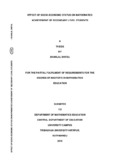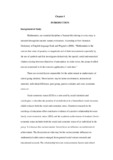Please use this identifier to cite or link to this item:
https://elibrary.tucl.edu.np/handle/123456789/1677| Title: | Effect of Socio-Economic Status on Mathematics Achievement of Secondary Level Students |
| Authors: | Dhital, Dhanlal |
| Keywords: | Socio economic;Mathematics;Achievement |
| Issue Date: | 2019 |
| Publisher: | Central Department of Education Mathematics |
| Abstract: | This is a survey study entitle “Effect of Socio-economic status on Mathematics Achievement of Secondary Level Students”. The objective of this study was to find the effect of socio-economic status on mathematics achievement at secondary level students. The sample of study included 120 students of grade IX from six government schools of Banke district were selected through simple random sampling method. An achievement test paper and questionnaire was the main instrument for the study. The mean, standard deviation, correlation and co-efficient of regression tools were used for analysis of data. Mathematics achievement was explained by four explanatory variables entered the multiple equation respectively. The variables parents’ educations, family income, family size, were found to be most strongly associated with the mathematics achievement of boys and girls respectively. The mean score of educated parent’s children is higher than mean score of literate and illiterate. Students of educated family have relatively good achievement in mathematics rather than literate and illiterate family. Similarly, the variable parents’ occupation was found to be positive influence on boy’s mathematics achievement and family income was strongly negative influence on girl’s mathematics achievement. Most of the children parents are engaged in the agriculture. There is more variability in the achievement of job occupation parent’s children then the agriculture and business occupation parents children. There is more variability in the achievement of low income and middle-income family’s children than high-income family children. Achievements of mathematics students were found to be positively associated with the parents’ education, parents’ occupations, parents’ income and family size. On the basis of above findings, the researcher concluded that the socio-economic status of the student effects directly in the mathematics achievement Parents’ Education status was found to be most strongly associated with mathematics achievement. In addition, family income and family size are low associated with mathematics achievement. Other socio-economic related variables parents’ occupation had a negative effect on the mathematics achievement. The family education is found to be highly signification in mathematics achievement in boy where as family size in girls. |
| URI: | http://elibrary.tucl.edu.np/handle/123456789/1677 |
| Appears in Collections: | English Language Education |
Files in This Item:
| File | Description | Size | Format | |
|---|---|---|---|---|
| Cover.pdf | 35.51 kB | Adobe PDF |  View/Open | |
| Chapter.pdf | 1.2 MB | Adobe PDF |  View/Open |
Items in DSpace are protected by copyright, with all rights reserved, unless otherwise indicated.
